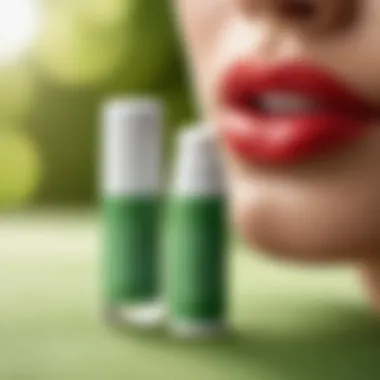Mastering Lip Balm: Techniques and Tips for Care


Intro
Популярные акции и предложения
The beauty industry is always evolving, with new products frequently entering the market. Consumers can benefit from staying informed about current promotions and offers that many brands provide.
Обзор текущих скидок на косметические бренды
Many cosmetic brands, such as Burt's Bees and ChapStick, often have seasonal sales and discounts. These promotions can help consumers find high-quality lip balms at reduced prices. Signing up for newsletters from these brands or following them on social media platforms can be an effective way to remain updated on ongoing discounts.
Сезонные распродажи и специальные предложения
In particular seasons, like winter and summer, specific sales on lip care products can occur. Winter promotions might include hydrating lip balms that combat dryness, while summer sales may focus on balms with SPF protection to ensure safety from sun damage. Keeping an eye on these seasonal deals is beneficial for consumers looking for effective lip care solutions at great prices.
Рекомендации по выбору косметики
Choosing the right lip balm involves understanding one's personal needs and preferences. Not all products are suitable for everyone, and awareness of ingredient differences can guide selections.
Как выбрать косметические средства по типу кожи
For individuals with sensitive lips, it is wise to choose balms with fewer ingredients, mainly those labeled as hypoallergenic. Brands like Nivea or Aquaphor might provide gentler options. Those with dry or chapped lips may prefer formulas rich in natural oils, such as jojoba or coconut oil, offered by brands like EOS and Kiehl's.
Советы по выбору косметики для разных возрастных групп
The needs vary across different age groups. For younger individuals, lighter formulas without heavy moisturizers may be enough, while older individuals might benefit from more nourishing products rich in vitamins and antioxidants. Products from brands like Neutrogena or Laneige cater to various demographics, ensuring that everyone can find an appropriate lip balm for their needs.
"Selecting the right lip balm is essential to achieving healthy and protected lips, regardless of age or skin type."
Intro to Lip Care
Lips are often overlooked in our skincare routines, yet they play a vital role in overall facial aesthetics and health. The importance of maintaining healthy lips cannot be overstated. A well-cared-for pout reflects personal hygiene and overall well-being. Neglecting lip care can lead to discomfort, chapping, and even infections, making it essential to understand the mechanisms of lip health and why products like lip balm are crucial.
Healthy lips not only enhance our appearance but also serve functional purposes. Soft and moist lips facilitate clear speech and improve the sense of taste. They also provide a barrier against environmental factors that can lead to dryness and irritation. Thus, incorporating lip care into daily routines is not merely about beauty; it is significantly related to our comfort and well-being.
When considering lip care, it is necessary to understand how external conditions impact lip health. Factors such as weather extremes, dehydration, and certain dietary choices can irritate sensitive lip skin. Therefore, lip balms formulated with suitable ingredients can offer essential moisture and create a protective layer against these elements.
"Lip care is not just an aesthetic choice; it is a fundamental aspect of personal health and hygiene."
Additionally, many individuals may not recognize the signs of dryness and chapping. Awareness of these symptoms can lead to quicker and more effective treatments using lip balms. By educating ourselves about the needs and vulnerabilities of our lips, we can take actionable steps to maintain their health and appearance effectively.
The sections that follow will delve into the different types of lip balms available, their proper application techniques, and how to integrate them into our daily routines for optimal lip care.
Types of Lip Balms
Lip balm serves as a crucial part of lip care, providing hydration and protection against environmental factors. The type of lip balm you choose can significantly impact the health of your lips. Understanding the different types available can help you select the most suitable one for your needs. This section will explore the distinctions between natural and synthetic ingredients, flavored versus unscented options, and the role of medicated lip balms in maintaining lip health.
Natural vs. Synthetic Ingredients
When it comes to lip balms, the debate between natural and synthetic ingredients often arises. Natural lip balms usually contain organic substances that can be beneficial for the skin. These may include beeswax, shea butter, and essential oils. They are known for being gentle on the lips and often provide additional nourishment. Conversely, synthetic lip balms may incorporate chemicals that can enhance texture and extend shelf life. While these ingredients can be effective, they may cause irritation for sensitive individuals. Thus, your choice should depend on your skin type and personal preference. You should always read the ingredient list to identify what suits you best.
Flavored and Unscented Options


The choice between flavored and unscented lip balms offers yet another layer of consideration. Flavored lip balms often attract users with their enticing aromas and tastes. They can give a pleasurable application experience, making routine use feel enjoyable. However, flavors may not appeal to everyone. Some people dislike the sweet or minty sensations, particularly if they are sensitive to taste or fragrance. Unscented lip balms, on the other hand, provide simplicity and focus purely on hydration without additional sensory distractions. They are often recommended for individuals prone to allergies or irritations, as they reduce the risk of adverse reactions. Ultimately, the choice between the two should align with your sensitivities and preference for sensory experiences.
Medicated Lip Balms
Medicated lip balms serve a specialized purpose. They are formulated to treat specific issues like severe chapped lips, cold sores, or lip irritations. Often containing active ingredients such as menthol, hydrocortisone, or other healing agents, these balms can provide instant relief. They are effective in repairing damaged skin and providing a barrier against further irritants. It is important, however, to remember that medicated balms may be too strong for everyday use, as they can dry out the lips if used excessively. Always consult a healthcare professional if unsure, especially for persistent lip issues.
In summary, choosing the right type of lip balm involves understanding your personal needs, preferences, and any sensitivities. Taking the time to read labels and understand ingredients can lead to better outcomes for lip health.
How to Apply Lip Balm Properly
Applying lip balm correctly is crucial to maintaining healthy lips. Improper application can lead to issues such as uneven coverage or insufficient moisture. This section will explore pre-application considerations, a step-by-step guide on the application process, and techniques to enhance the balm's effectiveness.
Pre-Application Considerations
Before applying lip balm, it is important to prepare your lips properly. Start by ensuring your lips are clean and dry. Residue from food, makeup, or skin products can hinder the balm from adhering properly. It is also a good idea to exfoliate your lips gently. This removes dead skin cells and provides a smoother surface. You can use a lip scrub or a soft toothbrush to achieve this. Having well-prepped lips allows the balm to penetrate better, resulting in improved hydration.
Temperature is another factor to consider. Applying lip balm in extreme weather conditions can affect its performance. For instance, in high heat, the balm may melt and offer less protection. In cold weather, your lips may require extra moisture before application. It is advisable to occasionally check the weather conditions to adjust your application routine accordingly.
Step-by-Step Application Process
Following an effective application process ensures the lip balm works as intended.
- Cleanse Your Lips: Ensure your lips are free from debris and makeup.
- Exfoliate: Use a scrub to gently smooth your lips.
- Select the Lip Balm: Choose a product meeting your needs, whether for moisture, protection, or healing.
- Apply Evenly: Using your fingertip or the balm's applicator, spread a thin layer over your lips. Make sure to cover the entire lip surface, including corners and edges.
- Let it Absorb: Allow some time for the product to absorb into the skin. Avoid licking your lips immediately after application, as this can remove the balm.
Make sure to apply the lip balm evenly for optimal effect. This method not only protects but also nourishes your lips.
Techniques for Long-Lasting Effect
To extend the benefits of your lip balm throughout the day, consider these techniques:
- Layering: If needed, you can layer your lip balm with other products like lipstick or gloss, but ensure the balm is applied first.
- Reapply Regularly: Make a habit of reapplying in dry or windy conditions to maintain moisture levels.
- Night Treatment: Using a thicker balm or a lip mask overnight can provide deeper hydration.
"Lip balm, when used correctly, can create a protective barrier that shields against dryness and irritation."
Using these techniques, you can achieve a more effective and lasting application. Regular attention to your lip care routine allows for healthier, hydrated lips.
Frequency of Use
The frequency of lip balm application plays a significant role in maintaining lip health. This article emphasizes understanding when to reapply lip balm and the broader seasonal considerations affecting lip moisture. Knowing how often to use lip balm can prevent dryness and help enhance overall lip care routines.
When to Reapply Lip Balm
Knowing when to reapply lip balm is crucial for optimal lip hydration. A good rule of thumb is to apply lip balm after eating or drinking. Food and beverages can strip away protective moisture. Also, consider reapplying after exposure to harsh elements like wind or sun.
For many people, applying lip balm multiple times throughout the day is beneficial. This habit ensures your lips stay hydrated consistently. However, personal needs may vary. Consider your environment and individual preferences.
Seasonal Considerations
The changing seasons can impact how and when lip balm should be used. In winter, cold air coupled with heating indoors can lead to cracked and dry lips. Increased frequency of application is often needed during these months. A thicker balm may be more effective to combat the harsh environment.
In contrast, summer heat, combined with sun exposure, can also dry out lips. Opting for a lip balm with SPF protection can be beneficial. Monitoring the condition of your lips is important during all seasons. Recognizing the signs of dryness will help you adjust your application frequency accordingly.


"Constant hydration is essential for maintaining healthy lips throughout the year."
Utilizing lip balm by adapting to the seasonal requirements becomes vital. Balancing frequency and types of lip balm aligns with maintaining moisture and protection.
Incorporating Lip Balm in Daily Routine
Incorporating lip balm into your daily routine is not merely a matter of comfort; it plays a crucial role in maintaining the health and appearance of your lips. Healthy lips contribute to a person’s overall appearance, and dry or chapped lips can detract from one's confidence. Thus, understanding how to integrate lip balm effectively can yield lasting benefits.
Combining with Other Lip Products
To maximize the effectiveness of lip balm, consider using it in conjunction with other lip products. Lip scrubs can be used before the application of lip balm. This can help remove dead skin cells, providing a smooth base for the lip balm. Incorporating a lip mask at night can also enhance hydration while you sleep, allowing your lips to absorb moisture deeply, preparing them for the day ahead.
When using lipstick or gloss, apply the lip balm as the first layer. This strategy not only moisturizes the lips but also allows for a more even application of color. It acts as a barrier, preventing the color from settling into cracks or dry patches; this can help achieve a polished look.
Additionally, tinted lip balms offer hydration and a hint of color. They are ideal for casual settings where you prefer a subtle look without sacrificing moisture. By strategically layering products, you create a customized lip care routine that adjusts to your needs and preferences.
Creating a Lip Care Schedule
Establishing a lip care schedule can greatly enhance the benefits you reap from regular lip balm use. One effective approach is to set specific times for reapplication throughout the day. For instance, it may be beneficial to apply lip balm after meals or drinks, as these activities can remove existing product. Incorporating lip balm into your morning and night routines is also essential.
In the morning, applying lip balm right after washing your face allows the product to lock in moisture and prep your lips for the day ahead. At night, a thicker layer can serve as an overnight treatment, offering intensive hydration while you sleep.
Creating a weekly check-in can also help assess the condition of your lips. Pay attention to changes like dryness or chapping, which may require adjusting the frequency of application or even the type of lip balm used. This ensures that your routine remains effective and adapts to your lips’ needs as seasons change.
Overall, integrating lip balm into your daily regimen using these methods can lead to improved lip health, enhanced appearance, and greater comfort in various environmental conditions.
Common Misconceptions About Lip Balm
Understanding the common misconceptions about lip balm is essential for optimal lip care. Misinformation can lead to improper usage and ineffective results. As many people overlook the subtlety of lip care, these misconceptions can affect both satisfaction and health. It is necessary to differentiate between myths and facts to fully harness the benefits of lip balm.
Myths vs. Facts
There are prevalent myths associated with lip balm that require clarification. Many individuals believe that frequent application of lip balm can lead to dependency. However, this notion is misleading. Lip balms are designed to provide moisture and protection but do not create a cycle of dependency. The truth is, regular use can help maintain lip hydration and prevent dryness.
Another common myth is that all lip balms are created equal. In reality, they vary greatly in terms of ingredients and effectiveness. Some might contain artificial flavors and colors, while others focus on natural and beneficial components. Understanding these differences is crucial for choosing the right product. Additionally, many assume that flavored lip balms are harmless. In fact, certain flavors can sometimes irritate sensitive lips, causing more harm than good.
"It's important to distinguish between effective lip care and overly commercialized products that might not serve your needs."
Potential Side Effects
Lip balms can indeed offer many advantages, but one must also be aware of potential side effects. Some individuals might experience irritation or allergic reactions due to specific ingredients such as fragrances or preservatives. It is wise to read labels carefully and identify any allergens that could pose a risk.
Another issue can arise from the overuse of certain medicated lip balms. While they serve a purpose, frequent use can sometimes lead to skin sensitivity or irritation. This is particularly true for products containing active ingredients like menthol or camphor.
Recognizing these side effects does not imply that one should avoid lip balm altogether. Instead, it calls for a greater awareness of one's own skin and careful selection. Testing new products on a small patch before widespread use can help in identifying adverse reactions early on. In summary, debunking myths and understanding the realities of potential side effects allows for informed decisions, leading to healthier lips.
Selecting the Right Lip Balm
Choosing the right lip balm is essential for effective lip care. With a broad variety of products on the market, understanding what distinguishes one balm from another is pivotal for maintaining healthy lips. The appropriate choice can prevent dryness, alleviate discomfort, and enhance overall lip appearance. This section will delve into critical factors to consider when selecting a lip balm, ensuring you select a product that meets your needs and preferences.
What to Look For in Ingredients


When evaluating lip balms, scrutinizing the ingredients list is a vital first step. You should prioritize lip balms that contain beneficial components. Natural ingredients like shea butter, coconut oil, and beeswax offer excellent moisturizing properties. These ingredients help in creating a protective barrier against external elements.
Some ingredients to consider include:
- Beeswax: Provides a natural barrier and retains moisture.
- Shea Butter: Offers hydration and nourishment, rich in vitamins.
- Coconut Oil: Known for its nourishing properties and ability to soothe chapped lips.
- Vitamin E: Helps in maintaining skin elasticity and is an antioxidant.
Consider avoiding products with potentially harmful additives. Many commercial lip balms include parabens and artificial fragrances. These substances can cause irritation and allergic reactions in some individuals. Stick to brands that emphasize transparency in their ingredients.
Identifying Allergens
It is critical to be aware of potential allergens in lip balm ingredients. Many people have sensitivities to common ingredients such as lanolin, certain oils, or flavor enhancers. To avoid adverse reactions, read labels carefully.
Some tips for identifying allergens include:
- Patch Testing: Before full application, test a small amount on the skin to gauge reaction.
- Research: Look up any unfamiliar ingredients to understand their origins and effects.
- Avoid Known Allergens: If you have previously identified allergens, steer clear of products containing those substances.
If you have a history of allergies or skin sensitivities, consider consulting a dermatologist for personalized advice on selecting lip care products. Knowing your skin type will aid in making informed choices, leading to healthier and more comfortable lips.
Benefits of Regular Use
The importance of regular use of lip balm cannot be overstated. For many, it is just an afterthought in their skincare regimen. However, investing time and attention into maintaining lip health can result in long-term benefits that enhance both comfort and appearance. Regular application creates a barrier that helps to maintain hydration, ensuring lips remain soft and supple.
Moisture Retention
Moisture retention is one of the core benefits of using lip balm consistently. During daily activities, lips are exposed to various elements that can lead to moisture loss, such as air conditioning, heating, and environmental pollutants. A quality lip balm traps moisture, preventing it from evaporating.
Using lip balm with hydrating ingredients like beeswax, shea butter, or coconut oil can significantly help in keeping lips plump and hydrated. These substances create a physical barrier that locks in moisture. When applied regularly, users may notice a marked improvement in the softness of their lips and a reduction in chapping and cracking.
It's essential to apply lip balm at least twice daily, especially after eating or drinking. This ensures that the protective barrier is consistently reinforced. If you're spending time outdoors or in dry environments, frequent reapplications can also maintain optimal moisture balance.
Protection Against Elements
Lips are often neglected in sun protection, but they are susceptible to sunburn and damage just like other parts of the skin. Therefore, using a lip balm with SPF provides critical protection against harmful UV rays. In addition to sun damage, cold weather and wind can wreak havoc on lip health, leading to dryness and irritation.
Good formulations typically include ingredients that soothe and protect against these external aggressors. Look for balms containing antioxidants, such as vitamin E, which help to shield lips from free radicals. This is particularly valuable during seasonal changes, where fluctuating temperatures can lead to sensitive lips.
Regular use of lip balm is not simply a luxury; it is a necessity for maintaining overall lip health. Investing in a good product can yield dividends in comfort and appearance.
In summary, the benefits of regular lip balm use extend beyond mere aesthetics. The dual advantage of moisture retention and protection against environmental factors ensures that lips remain healthy, vibrant, and comfortable throughout the year. As lip care becomes an integral part of a daily routine, individuals will notice substantial improvements and a decrease in common issues such as chapped lips.
End
In this article, we have outlined various facets of lip balm usage, emphasizing its significance in maintaining healthy lips. Proper lip care is not just about aesthetics; it is a critical aspect of personal health. Ensuring that lips remain well-hydrated not only enhances appearance but also protects against damage. This protection becomes crucial in different environments and seasons, where exposure to harsh elements can lead to severe dryness or chapping.
Recap of Key Points
- Understanding Your Lips: Acknowledging the unique needs of lips is essential. Regular assessment can guide you in selecting appropriate products based on those needs.
- Types of Lip Balms: Familiarity with the ingredients can empower choices. Natural and synthetic options serve different purposes; knowing their benefits and drawbacks is vital.
- Application Techniques: Effectiveness depends on proper application. Steps to ensure a smooth and lasting application create a foundation for lip care routines.
- Frequency of Use: Situational needs dictate how often to reapply lip balm. Understanding environmental factors can influence how frequently you should reach for your lip care product.
- Creating a Routine: Incorporating lip balm into daily practices leads to consistent protection and moisture retention.
As you reflect on these points, consider how they apply to your own lip care journey.
The Path Forward in Lip Care
Embracing a proactive approach to lip care can lead to long term benefits. Start by integrating selected lip balms into your daily skincare routine. This might mean keeping a stick handy at your desk or in your bag. You should also evaluate the ingredients, especially if you have sensitivities or special requirements. Choosing products with natural oils or beeswax, for example, might be beneficial for many.
Moreover, remain informed about common misconceptions surrounding lip balm. Understanding the facts can help you avoid ineffective practices or products that may irritate rather than help your lips. As seasons change, adapt your lip care strategy accordingly; for instance, you may need more frequent applications during winter months when the air is dry.
Ultimately, the journey of lip care is personal. Pay attention to how your lips respond to different products and adjust as necessary. In this way, you will cultivate a deeper understanding of your needs, enhancing overall health and comfort.













